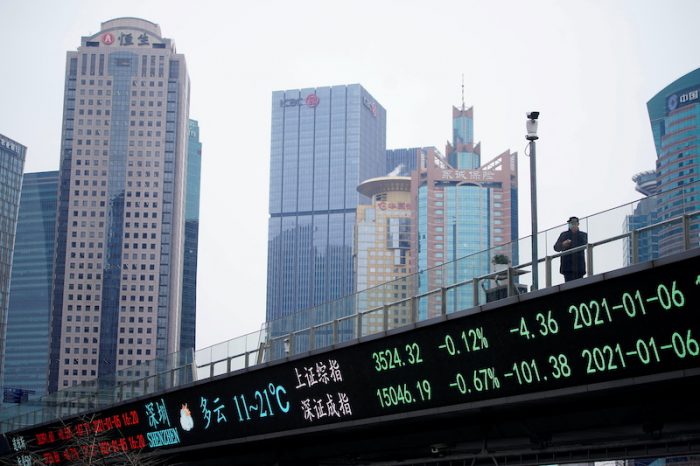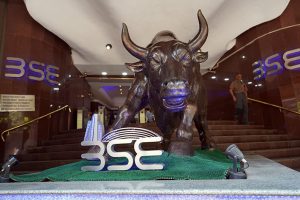Asian share prices were a mixed bag on Thursday with investors going in different directions, boosted on the one hand by tech firm optimism and worried on the other by China’s uncertain recovery.
And there was the persistent threat of inflation which brings with it more caution with traders anxious ahead of another expected 25 basis point hike in interest rates by the US Federal Reserve next month.
However, Japan’s Nikkei share average rose, clawing back losses from the previous day as retailers surged from an increase in foreign visitors and semiconductor shares rebounded from early declines.
Also on AF: India to Overhaul China as Most Populous Nation by June: UN
The Nikkei share average edged up 0.18%, or 50.81 points, to close at 28,657.57, though the broader Topix was down 0.03%, or 0.65 points, to 2,039.73.
Chip-making equipment giant Tokyo Electron Ltd rose 1.75% and chip-testing equipment maker Advantest Corp gained 2.2%, to be the No2 and No3 supports. But startup investor SoftBank Group Corp was the Nikkei’s biggest drag, with a 1.64% retreat.
Mainland Chinese stocks fell, even as information technology shares shot up, after data revealing an uneven economic recovery after the country’s reopening this year continues to weigh on market sentiment.
But even amid a muted market mood, investors continue to bet on Artificial Intelligence (AI) stocks. Frenzy around Chinese equivalents of OpenAI’s ChatGPT chatbot boosted shares of companies in the tech, media and telecom sector.
Shares of AI, semiconductor, and media companies jumped between 2% and 3.6%. However, analysts say that surging AI stocks have drained money from other sectors such as the new energy and consumer companies, putting pressure on the broader market. New energy companies fell 2.6%.
The Shanghai Composite Index fell 0.09%, or 3.10 points, to 3,367.03, while the Shenzhen Composite Index on China’s second exchange dropped 0.40%, or 8.56 points, to 2,117.94.
In Hong Kong, tech giants added 0.3%, but mainland property developers declined 1.5%. The benchmark Hang Seng Index gained 0.14%, or 29.21 points, to 20,396.97.
Elsewhere across the region, in early trade, Sydney and Manila were up but Singapore, Seoul, Wellington and Taipei were negative. MSCI’s broadest index of Asia-Pacific shares outside Japan was 0.16% lower.
Hawkish Fed Rhetoric
Traders are bracing for meetings from central banks in the next few weeks as easing worries over the banking sector brings inflation and monetary policy back into focus.
A Reuters poll of economists showed the Fed is likely to deliver a final 25-basis-point rate increase in May and then hold rates steady for the rest of the year. Markets are pricing in an 83% chance of the Fed hiking by 25 basis points, CME FedWatch tool showed.
The hawkish rhetoric from Fed speakers continued with Federal Reserve Bank of New York President John Williams saying that the inflation rate is still at problematic levels and that the US central bank will act to lower it.
US economic activity was little changed in recent weeks as employment growth moderated somewhat and price increases appeared to slow, showed a Fed report on Wednesday.
The central bank’s latest read on the state of the economy provides a snapshot of business, bank and worker conditions in the aftermath of the mid-March failure of two large regional banks that shook confidence in the US financial sector.
But as fears of a broad crisis eased, volatility has become less wild. On Wednesday, the CBOE Volatility index, nicknamed Wall Street’s fear gauge, fell to its lowest point since November 2021.
Meanwhile, benchmark 10-year yields eased to 3.597% in Asian hours after scaling a four-week peak of 3.639% on Wednesday.
The two-year US Treasury yield, which typically moves in step with interest rate expectations, was down 1.3 basis points at 4.252%, having touched 4.286% on Wednesday, the highest since March 15.
In currency markets, the US dollar index fell 0.039%, with the euro up 0.04% to $1.0958. The yen weakened 0.08% to 134.83 per dollar, while sterling was last trading at $1.2432, down 0.05% on the day.
Elsewhere, US crude fell 0.45% to $78.80 per barrel and Brent was at $82.68, down 0.53% on the day.
Key figures
Tokyo – Nikkei 225 > UP 0.18% at 28,657.57 (close)
Hong Kong – Hang Seng Index > UP 0.14% at 20,396.97 (close)
Shanghai – Composite < DOWN 0.09% at 3,367.03 (close)
London – FTSE 100 < DOWN 0.16% at 7,885.87 (0934 GMT)
New York – Dow < DOWN 0.23% at 33,897.01 (Wednesday close)
- Reuters with additional editing by Sean O’Meara
Read more:
China Becoming More Rival Than Partner: German Baerbock
India May Restart FTA Talks With Moscow as Trade Soars























